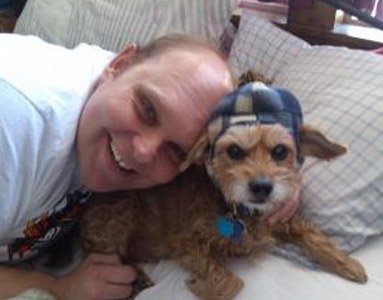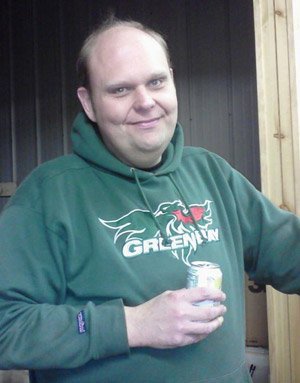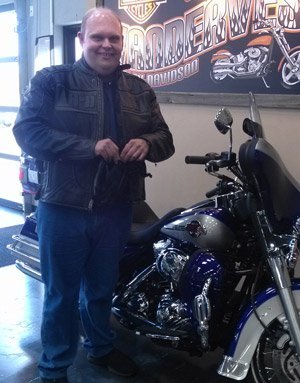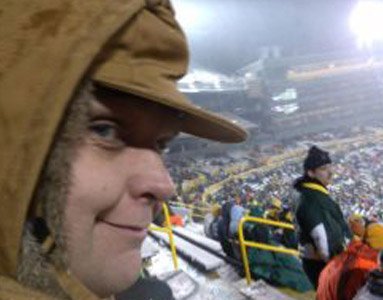Social Security makes every effort to ensure that any information published is accurate and up to date, but some information on this webpage may be historical.
Rob's Success Story
Video Transcript
Don Jenin, Rob's employer: He drives 108 miles one way to work. To both sites, same amount of time. Uh... snowstorms? Robby is still on time. He's got a tremendous amount of pride in his work and in himself.
Michelle Brigham, Rob's girlfriend: Robby's just a go-getter. He just, he wants everything. He wants to try everything. He wants to be able to do everything and healing is a part of that, you know? With the sickness, it really hindered him. To be able to get back into the workforce and to get back to work and traveling and everything has just- it's been a wonderful thing for him.
Rob McClain: Pretty much, I was overweight and I was always doing something. I was always, in order to keep five businesses going, you know, it was just something I needed to keep going. So, my weight problem was deteriorating my health. I had some history of kidney failure and then I got sick when I was in the middle of that and that's when I had to shut everything down. Finally, my kidneys completely failed. The only way to get a kidney transplant was I needed to lose the weight. I went from like around 550 to 250 [pounds]. I had a transplant and it was scary. It was really, I didn't know what to expect. I had bills. I didn't know what, you know, how to transition from work and tell Social Security. So, finally I went and I got on to Social Security through my doctor's office, and at that time too then I went back to school as well. To college.
Eric Craver, Academic Advisor, University of Wisconsin at Green Bay: What was clear with Rob immediately is that he was not comfortable where he was. He knew that he had uh... he had to get back to work and it needed to be meaningful work and... Now in the process he was going to do anything that he needed to do to make that happen within the context of his existing circumstances. He knew that he had health issues that need to be addressed and he knew that in order for him to be able to get back into some work that was meaningful, that really did uh... serve him but also put him in a position where he could earn a living that was gonna support him, that he needed a college degree. He was also very active as any EMT in the mountain area and that was something that meant a lot to him.
Rob McClain: And then after I got that degree, it was like, one of the biggest accomplishments because I worked during my sickness and I wanted to get myself back into life, to where I can enjoy it, and I don't have to be reliant on a government program. I didn't want to keep living that way, on a fixed income in a limited area of being able to do things. My DVR (Department of Vocational Rehabilitation) had said we have Ticket to Work program. After you... there's certain agencies that represent Ticket to Work and ERI was the one that was most uh...suggested by them.
Kate Kingree, Ticket to Work Program Manager, Employment Resources, Inc: Well, when Robby came to us, he had a lot of questions. First, Robby with very well-versed, more than a lot of individuals who come to me, in understanding his benefits. He knew that he had work Incentives and he also knew that he was able to continue a lot of his, continue with his medical insurance you know we worked together to talk to Social Security to ensure that the month that he actually was using trial work was accurately reflected in his Social Security record. Ticket to Work program offers individuals access to employment services for free. Work Incentives are given to an individual through virtue of whatever their entitlement is. So, an individual who's receiving SSI has different Work Incentives versus an individual who has SSDI. An individual does not need to assign their ticket in order to access Work Incentives. Anyone can go to work who has a disability and utilize Work Incentives.
Rob McClain: Anytime I had a question, she was available. She helped me through the programs. Any of my questions and concerns I had, we'd take them on, you know, put them down. And we'd take one at a time until we got them accomplished. So anybody out there that has worries, it's only human nature to be worried. But in all reality, until you start getting through it, you just take one day at a time. You’ll be just fine. You'll get through it. So if your health happens to keep you from working yet, you still can go back into the program and they're there to help the transition. Any which way you want to go; they're there to help you.
Rob McClain: That one must've been my birthday huh?
Marylain McClain (Rob's Mother): Yeah, because you had a birthday cake in front of you, unless you stole somebody else's cake.
Marylain McClain: Oh, he was so happy because he could go back to work. And he started, uh, he got on the Internet and he started looking different places, what he could take and where there was jobs available and he came up on this, um, this one part where it was at the DMV. So then, then he started going. He went all over the country for the interviews.
Don Jenin: Uh, and Robby was hired as a part-time examiner down in the southwest corner of the state. Uh... when we opened up uh... the opportunity at Chilton [part of Wisconsin] Robby took a transfer up to Chilton. Um, at that time he was just part-time but we were able to get a 50/50 position where we could get him over to [inaudible] and allow him to be full-time. He is a kind of guy that when he's at work, he shows a deep appreciation for having a job. He is very dependable. He wants to be out there doing his job. He wants to be accepted. He is, pretty much.
Steve Harkema (Chief, Fire Department): He operates as a firefighter also, and an engineer on the different apparatuses. I think actually overcoming a profound illness, such as a transplant and being able to recuperate to the point where you can come back and be incredibly productive, not only for yourself, for self-esteem reasons and for your own pride and goals. But he really adds flavor to the general overall work environment. So I think he's a huge benefit and he's done a fantastic job in coming back.
Rob McClain: The Ticket to Work program has kept me stable, has kept me you know, to be able to stay with my job, to help support me. Any needs that I'll be having in the future it will keep me going and keep me working.
Marylain McClain: He's my hero because of what he went through. He's always tried and he'd never complain and uh, and even all the days, you never hear him say, you know, "Oh, I'm so tired." He just goes on right to work. He just never liked to be on Social Security [benefits]. So when he got his job, it was a real blessing for him.
Rob McClain: I guess I'm not scared to keep taking steps forward. In my whole entire time here, I never took step back. I always took a step forward. I always maybe stopped a little bit to reassess my choices, but I never went back. I always went forward.
Rob McClain: Alright, you ready? Big smile now! 1, 2, 3. There we go.
300 Pounds Lost, One Kidney Gained, and Financial Independence Recovered: Rob's Story
Published in 2013
 Some would call Rob an "old soul." He seems to have a kind of wisdom that many people don't pick up before their Golden Years. Rob invests heavily in his relationships. He has cared for family, friends and neighbors in his community for years. Because Rob is a volunteer firefighter and Emergency Medical Technician (EMT), he has become a familiar and beloved figure in his hometown of Mountain, Wisconsin.
Some would call Rob an "old soul." He seems to have a kind of wisdom that many people don't pick up before their Golden Years. Rob invests heavily in his relationships. He has cared for family, friends and neighbors in his community for years. Because Rob is a volunteer firefighter and Emergency Medical Technician (EMT), he has become a familiar and beloved figure in his hometown of Mountain, Wisconsin.
Mountain is a rural community located in Northeast Wisconsin. With fewer than 300 families, it's not surprising that people take care of one another there. "When you think of other people, it makes life rich," he says. "It feels good to connect with our neighbors and [be part of] our town." As Rob traveled from prosperity to death's door and back, he found that a strong connection to his community paid dividends when he most needed them.
Home-Grown Entrepreneur
A blizzard dumped two feet of snow on Mountain in 1987. Cars were stuck all over town, and there weren't enough tow trucks. Rob was just 16 when he received a call from the sheriff's department asking for help. He had bought himself a used tow truck, intending to earn some money. This was his chance to try it out for the first time. Soon, Rob was getting calls from four area sheriffs' departments. It was the season that launched Rob’s towing & trucking business. His enterprise expanded quickly, and was incorporated as Big Rob's Inc. (BRI) in 1998. "We hired drivers, an office manager, a trucking manager, a dispatcher, two mechanics, two controllers and two attorneys," he recalls. Rob was glad he could provide employment in his town, and BRI's growth was a source of satisfaction.
Restless energy and a need to make ends meet fueled Rob's drive to work several jobs at a time. "In a small community like [Mountain], people sometimes work 3 or 4 jobs to pay the bills," he explains. Along with BRI and his work as a first responder, Rob became Director of Investigations for the local Gaming Commission. It was a period of prosperity, and he was satisfied with the activity in his 60-hour work week. But Rob's ambitious spirit was no match for the health challenges he would have to face.
Decline
Rob had struggled with his weight since childhood. By 1999 he weighed 550 pounds, and was finding it increasingly difficult to do the things he wanted to do.
"Everything was hard. People stared. Travel was complicated. I had to buy special clothes. But the most difficult part was the effect on my health. It was deteriorating and I couldn’t keep up with work."
Rob was diagnosed with renal failure, and his company filed bankruptcy in 2000. "Things really started to fall apart," he recalls. "I went into a depression when I had to tell the employees we were going out of business. All these families depended on [BRI]. I felt terrible."
 Rob began dialysis in 2005. He would need a new kidney and wondered whether his time was up. He was not ready to give up on life, but didn't know whether his body was. For a kidney transplant to succeed, Rob needed to lower his blood pressure and manage other health conditions that could complicate recovery. Rob and his doctors decided that gastric bypass surgery offered him the best chance. He was approved for Social Security Disability Insurance (SSDI), and prepared for the medical challenges that lay ahead.
Rob began dialysis in 2005. He would need a new kidney and wondered whether his time was up. He was not ready to give up on life, but didn't know whether his body was. For a kidney transplant to succeed, Rob needed to lower his blood pressure and manage other health conditions that could complicate recovery. Rob and his doctors decided that gastric bypass surgery offered him the best chance. He was approved for Social Security Disability Insurance (SSDI), and prepared for the medical challenges that lay ahead.
Dialysis, With a Side Order of College... To Go
Rob was hospitalized for much of 2006. His surgery was a success, and the results surpassed everyone's expectations. "The doctors were astonished that the weight came off so quickly," he recalls. "I lost both kidneys. But I also lost 300 pounds, my high blood pressure, and sleep apnea!"
Dialysis treatment continued for 6 hours per day, 3 days a week, and Rob became restless. "I never in my life came to a stop... I had to keep moving forward," he said. Rob decided to use his time on dialysis to earn a bachelor's degree. With help from Wisconsin's Department of Vocational Rehabilitation (VR), he purchased a laptop and enrolled at the University of Wisconsin Green Bay. Classes were online, and he worked on a degree in interdisciplinary studies while waiting for a kidney.
In November of 2008, Rob was thankful for many things. Neighbors held a fundraiser for medical bills, and the support was overwhelming. But nothing touched him like the generosity of his friend Pam Nelson. During the 15 years that they worked together as emergency responders, she watched him struggle with kidney disease. Pam decided to give Rob one of her kidneys. "She's a special person," he says. "She saved my life." The transplant was a success, and Pam was recognized with a medal for her heroic gift.
Rob's Ticket to Work
After Rob's health improved and he had earned a bachelor’s degree, he felt ready to return to work. His VR counselor told him he was eligible to receive free employment support services through Social Security's Ticket to Work Program. Social Security disability beneficiaries age 18 through 64 qualify. A range of services that help people prepare for and find employment are available through VR agencies and authorized providers known as Employment Networks (ENs). ENs also offer support services that can help people stay employed or advance in their career.
Employment Networks
ENs offer free services through Ticket to Work that can help you:
- Find answers to your questions about employment and benefits
- Prepare for the workforce
- Find a job and stay employed
- Advance in your current job
- Get job accommodations
- Stay in touch with Social Security
- Stay Organized
Read tips on choosing the right EN. Use the "Find Help" tool to connect with providers who offer the services you need to start or advance your career.
About Work Incentives
Many different Work Incentives are available to help people go to work. These rules can help you:
- Keep your Medicaid or Medicare coverage while working
- Prepare for work while receiving cash benefits
- Work while receiving some or all of your cash benefits
- Get back on benefits if you are unable to continue working
To find out how Work Incentives apply to you, consult a benefits counselor. To find one, use the "Find Help" tool. Or, call the Ticket to Work Help Line at the number below. Ask for help finding an EN that has a qualified benefits counselor on staff.
Rob received help with his résumé and job leads from Wisconsin's state VR agency. In 2011, he was offered a job as a Field Agent Examiner for the Department of Transportation (DOT). He looked forward to returning to work, but was also apprehensive. "SSDI and Medicare are stable. The workforce is not. I was glad to find work, but didn't want to lose my disability benefits," he said.
An EN Joins 'Team Rob'
When Rob's VR services came to an end, his counselor referred him to an EN called Employment Resources, Inc. (ERI). ERI would continue where VR left off, providing services to help him succeed in the workforce.
Partnership Plus
Most people who become employed with help from a state VR agency find that VR services end approximately 90 days after they start working. Many people like Rob need ongoing support to remain employed and increase earnings over time. To provide support services for employed Ticket program participants, VR agencies sometimes collaborate with ENs. This arrangement, known as "Partnership Plus," gives participants continued access to individualized employment services if needed. You may decide to work with an EN of your choice to receive support that continues after you are on the job. Partnership Plus sets people up for success by providing support at each step to financial independence.
Providers (like ERI) that offer benefits counseling can help people understand what employment will mean for their benefits. Rob was grateful to find attentive professionals who answered his questions, explained the rules around Social Security benefits and employment, and made it easier to focus on achieving his employment goals. He came to the meeting with his benefits counselor carrying a heavy load of concern, and he left looking forward to his new job at DOT.
 The benefits counselor at ERI told Rob about Social Security rules called Work Incentives. Work Incentives make it easier for adults with disabilities to enhance job skills and gain work experience. As an SSDI beneficiary, some of these rules were of particular interest to him.
The benefits counselor at ERI told Rob about Social Security rules called Work Incentives. Work Incentives make it easier for adults with disabilities to enhance job skills and gain work experience. As an SSDI beneficiary, some of these rules were of particular interest to him.
When Rob learned that SSDI recipients can receive cash benefits while they test their ability to work during a 9-month "Trial Work Period" (TWP), he became less concerned about returning to work. As soon as the TWP ends, a 36-month "Extended Period of Eligibility" (EPE) begins. During the EPE, SSDI cash benefits are suspended only in months when earnings go over the amount that Social Security calls "Substantial Gainful Activity" ($1,740 for adults with blindness, or $1,040 for adults with other disabilities in 2013).
Rob was particularly relieved when his benefits counselor informed him about a Work Incentive called "Continuation of Medicare Coverage." According to this rule, SSDI recipients who work continue to receive Medicare benefits for at least 7 years and 9 months after completing the TWP. The Work Incentive that put Rob most at ease is known as "Expedited Reinstatement" (EXR). Rob learned that EXR may enable Social Security to re-start his benefits without a new application, if he has to stop work because of his disability within five years. He felt better about returning to work knowing he would have time to acquire new skills and settle into his job without fear of losing his benefits.
"Keeping track of my benefits and the rules I needed to follow was overwhelming," he said. "ERI was there to answer all of my questions and they helped me with the Social Security correspondence that can be so intimidating. I've got a lot on my plate, and it helps to have them on my team!"
Another Fulfilling Day
 Motorist despair at the DMV is a familiar phenomenon. But those who land in Rob's line will find a friendly and helpful reception when they reach the front. "I process drivers' licenses..." he explains with enthusiasm. "My favorite part of the job is taking people out for their road tests. I meet a lot of interesting people this way, and also come across some welcome familiar faces!"
Motorist despair at the DMV is a familiar phenomenon. But those who land in Rob's line will find a friendly and helpful reception when they reach the front. "I process drivers' licenses..." he explains with enthusiasm. "My favorite part of the job is taking people out for their road tests. I meet a lot of interesting people this way, and also come across some welcome familiar faces!"
Rob has traded his SSDI cash benefit for a larger paycheck, and he's not looking back. He says it feels like he has lived several lives and traveled 10,000 miles since the start of his health challenges. He's content, and appreciates having days that are once again fulfilling.
"I love my job," he says. "The people I work with are like family and I get to interact with the community again. When I was sick I had to give up a lot. The [Ticket] Program helped me transition back to stability, and it feels great to have choices again. Ticket to Work and Work Incentives helped me recover them!"
With the right support, Rob found his path to a better future. To learn more, call the Ticket to Work Help Line at 1-866-968-7842 or 1-866-833-2967 (TTY).
Sources: In addition to direct interviews with Rob and staff at ERI, information for this article was paraphrased from a fox11online.com article titled "Thankful for a Special Friend," published 11/27/08. Reference was also made to "Education on a Road to Recovery," featured in UW-Green Bay's Inside newsletter, January 2008 issue.